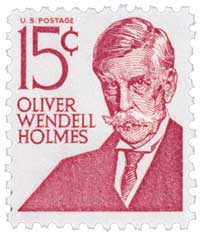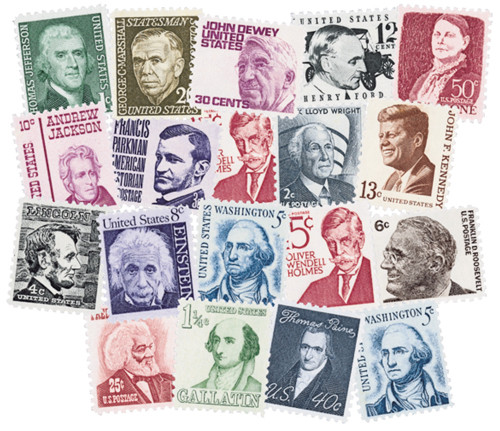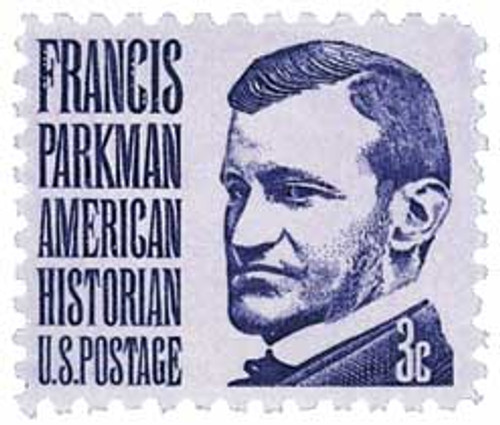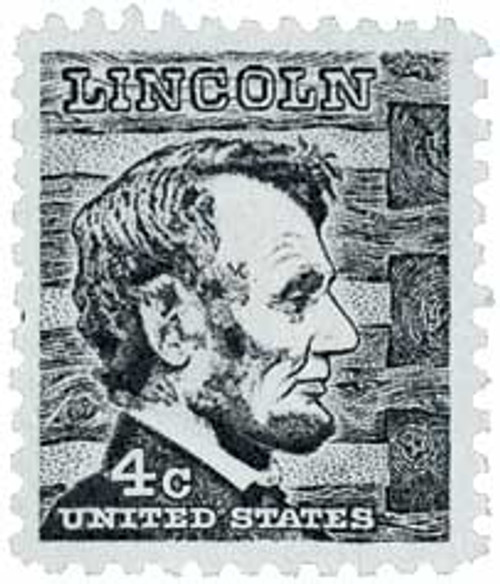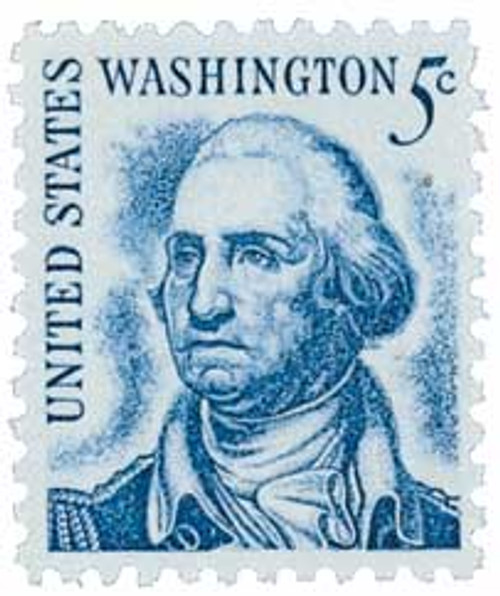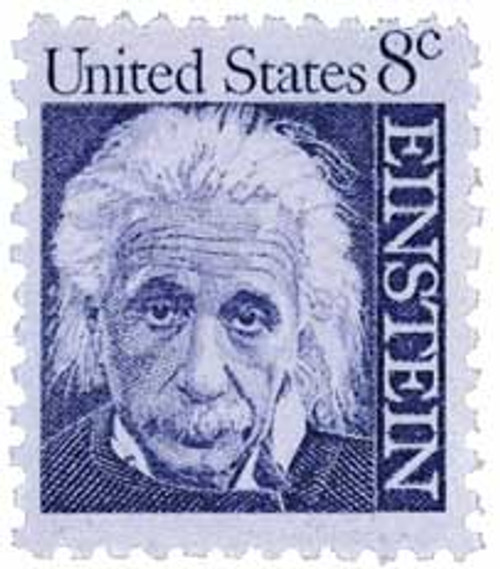
# 1288 PB - 1968 15c Prominent Americans: Oliver Wendell Holmes
15¢ Oliver Wendell Holmes
Prominent Americans Series
City: Washington, DC
Printed By: Bureau of Engraving and Printing
Printing Method: Rotary Press
Color: Magenta
Birth Of Oliver Wendell Holmes, Jr.
Holmes was a descendant of the powerful Quincy political family and the son of Oliver Wendell Holmes, Sr., a prominent writer and physician. While Oliver Jr. and his mother Amelia supported the abolitionist movement, Oliver Sr. was interested only in preserving the nation. His attitude changed after South Carolina seceded, when the senior Holmes became a firm Unionist.
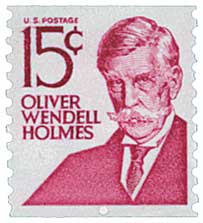
As his father began publishing patriotic pieces supporting the Union cause, the younger Holmes graduated from Harvard University in 1861. He then enlisted and was awarded a commission as a first lieutenant in the 20th Regiment of the Massachusetts Volunteer Infantry.
The officers of the newly formed 20th Massachusetts Volunteer Infantry were mostly Holmes’ classmates and the group quickly became known as the “Harvard Regiment.” Oliver Wendell Holmes, Jr.’s first service in battle was at Ball’s Bluff during October 1861, where nearly half the Union’s 1,700 troops were killed or wounded. Holmes was one of the casualties, suffering a serious shot in the chest. After a lengthy recuperation, he rejoined his regiment in time to witness the loss of several comrades killed in the Battle of Fair Oaks in June 1862.
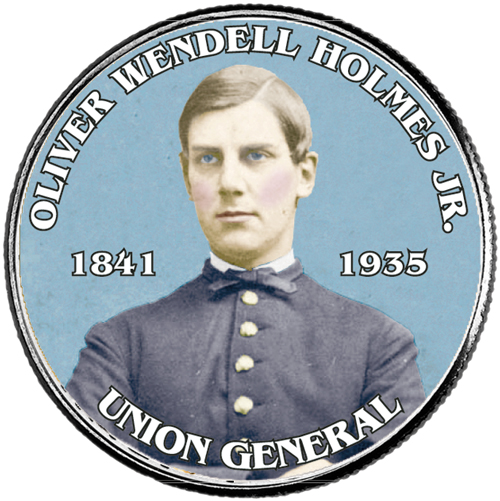
Having attained the rank of captain, Holmes was wounded again during the Battle of Antietam. Holmes was shot in the neck while retreating during the one-day battle, which was the bloodiest in American history with 23,000 casualties. Telegraph wires were jammed the evening of September 17, 1862, as newspaper correspondents filed stories of the day’s horrendous events and comrades alerted families of the fate of fallen soldiers.
One of the telegraphs was sent to Oliver Wendell Holmes, Sr., in Boston. “Capt. Holmes wounded, shot through the neck. Thought not mortal at Keedysville.” A distinguished surgeon, the elder Holmes knew a shot to the neck was more likely lethal. He immediately boarded a southbound train in search of his son. During his journey, Holmes met a soldier that “mentioned incidentally having heard a story that… Wendell was killed.” Determined to find his son, Holmes pressed on and found him 11 days later. Holmes not only recovered, but returned to service and was wounded a third time in May of 1863.
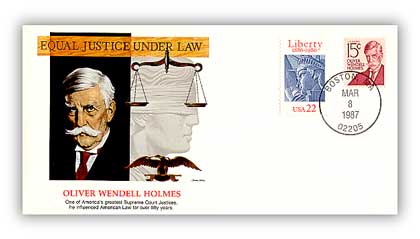
After the war Holmes attended Harvard Law School, graduated in 1866 and passed the bar the following year. He quickly began working as a lawyer while also writing essays for law journals. Holmes served as editor of the American Law Review and returned to Harvard to lecture. Holmes joined the Massachusetts Supreme Court in 1883 and was made its chief justice in 1889. He would only hold that position for two years before he was called on for a higher position.
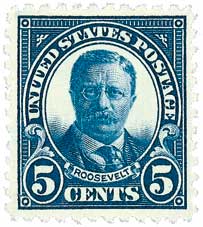
In August 1902, President Theodore Roosevelt named Holmes to a seat on the U.S. Supreme Court to replace the retired Horace Gray. Senator Henry Cabot Lodge reportedly recommended Holmes, though Roosevelt had also admired Holmes’ speech, “Soldier’s Faith.” Some historians consider Holmes’ appointment one of the few in U.S. Supreme Court history not motivated by partisanship or politics, but solely on the nominee’s contribution to law.
Holmes was formally nominated on December 2 and confirmed unanimously by the Senate two days later. One of the best-known American judges, Holmes served as a member of the Supreme Court for 30 years. Known as the “Great Dissenter,” he insisted laws be viewed in light of a changing society rather than as old formulas to be adhered to. In 1881, Holmes wrote, “The life of the law has not been logic: it has been experience…the law embodies the story of a nation’s development through many centuries, and it cannot be dealt with as if it contained only the axioms and corollaries of a book of mathematics.”
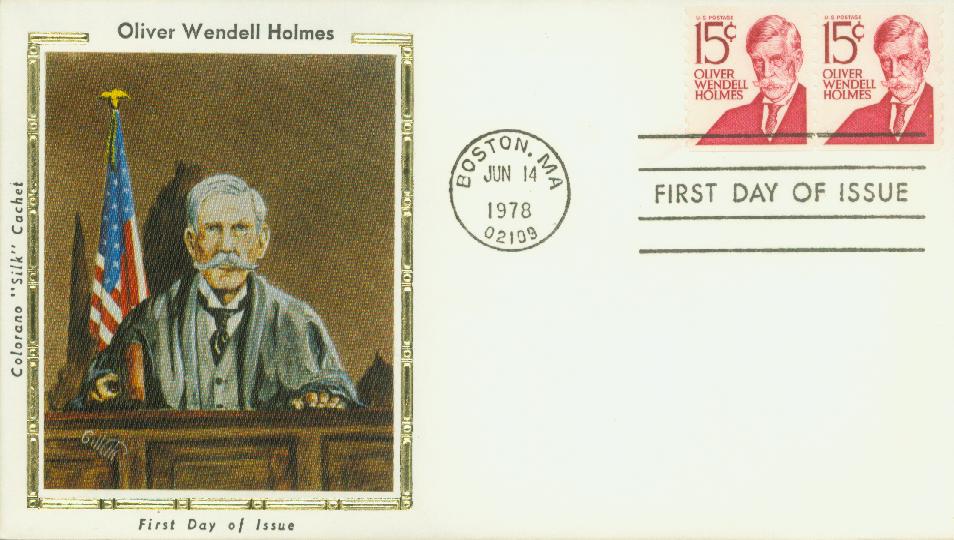
Holmes retired in 1932 and passed away peacefully on March 6, 1935, at the age of 93. His lifelong wish of interment with his fellow soldiers at Arlington National Cemetery was granted. Infantrymen fired three volleys during the burial ceremony – one for each of the Civil War battles in which Holmes was wounded. Holmes chose to be remembered on his tombstone for what he considered his highest honor: “Captain and Brevet Colonel, 20th Mass. Volunteer Infantry.”
Click here for a collection of Holmes’ quotes.
15¢ Oliver Wendell Holmes
Prominent Americans Series
City: Washington, DC
Printed By: Bureau of Engraving and Printing
Printing Method: Rotary Press
Color: Magenta
Birth Of Oliver Wendell Holmes, Jr.
Holmes was a descendant of the powerful Quincy political family and the son of Oliver Wendell Holmes, Sr., a prominent writer and physician. While Oliver Jr. and his mother Amelia supported the abolitionist movement, Oliver Sr. was interested only in preserving the nation. His attitude changed after South Carolina seceded, when the senior Holmes became a firm Unionist.

As his father began publishing patriotic pieces supporting the Union cause, the younger Holmes graduated from Harvard University in 1861. He then enlisted and was awarded a commission as a first lieutenant in the 20th Regiment of the Massachusetts Volunteer Infantry.
The officers of the newly formed 20th Massachusetts Volunteer Infantry were mostly Holmes’ classmates and the group quickly became known as the “Harvard Regiment.” Oliver Wendell Holmes, Jr.’s first service in battle was at Ball’s Bluff during October 1861, where nearly half the Union’s 1,700 troops were killed or wounded. Holmes was one of the casualties, suffering a serious shot in the chest. After a lengthy recuperation, he rejoined his regiment in time to witness the loss of several comrades killed in the Battle of Fair Oaks in June 1862.

Having attained the rank of captain, Holmes was wounded again during the Battle of Antietam. Holmes was shot in the neck while retreating during the one-day battle, which was the bloodiest in American history with 23,000 casualties. Telegraph wires were jammed the evening of September 17, 1862, as newspaper correspondents filed stories of the day’s horrendous events and comrades alerted families of the fate of fallen soldiers.
One of the telegraphs was sent to Oliver Wendell Holmes, Sr., in Boston. “Capt. Holmes wounded, shot through the neck. Thought not mortal at Keedysville.” A distinguished surgeon, the elder Holmes knew a shot to the neck was more likely lethal. He immediately boarded a southbound train in search of his son. During his journey, Holmes met a soldier that “mentioned incidentally having heard a story that… Wendell was killed.” Determined to find his son, Holmes pressed on and found him 11 days later. Holmes not only recovered, but returned to service and was wounded a third time in May of 1863.

After the war Holmes attended Harvard Law School, graduated in 1866 and passed the bar the following year. He quickly began working as a lawyer while also writing essays for law journals. Holmes served as editor of the American Law Review and returned to Harvard to lecture. Holmes joined the Massachusetts Supreme Court in 1883 and was made its chief justice in 1889. He would only hold that position for two years before he was called on for a higher position.

In August 1902, President Theodore Roosevelt named Holmes to a seat on the U.S. Supreme Court to replace the retired Horace Gray. Senator Henry Cabot Lodge reportedly recommended Holmes, though Roosevelt had also admired Holmes’ speech, “Soldier’s Faith.” Some historians consider Holmes’ appointment one of the few in U.S. Supreme Court history not motivated by partisanship or politics, but solely on the nominee’s contribution to law.
Holmes was formally nominated on December 2 and confirmed unanimously by the Senate two days later. One of the best-known American judges, Holmes served as a member of the Supreme Court for 30 years. Known as the “Great Dissenter,” he insisted laws be viewed in light of a changing society rather than as old formulas to be adhered to. In 1881, Holmes wrote, “The life of the law has not been logic: it has been experience…the law embodies the story of a nation’s development through many centuries, and it cannot be dealt with as if it contained only the axioms and corollaries of a book of mathematics.”

Holmes retired in 1932 and passed away peacefully on March 6, 1935, at the age of 93. His lifelong wish of interment with his fellow soldiers at Arlington National Cemetery was granted. Infantrymen fired three volleys during the burial ceremony – one for each of the Civil War battles in which Holmes was wounded. Holmes chose to be remembered on his tombstone for what he considered his highest honor: “Captain and Brevet Colonel, 20th Mass. Volunteer Infantry.”
Click here for a collection of Holmes’ quotes.




